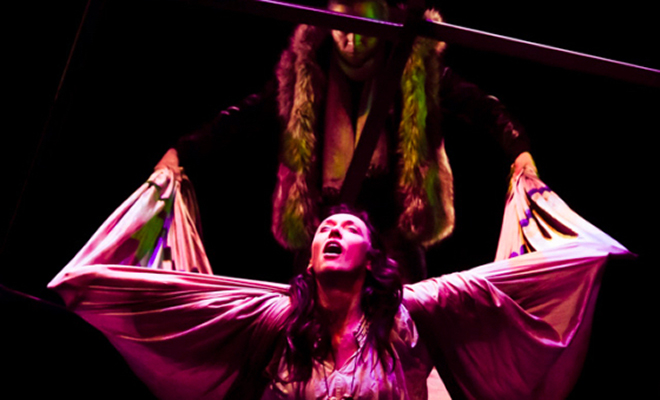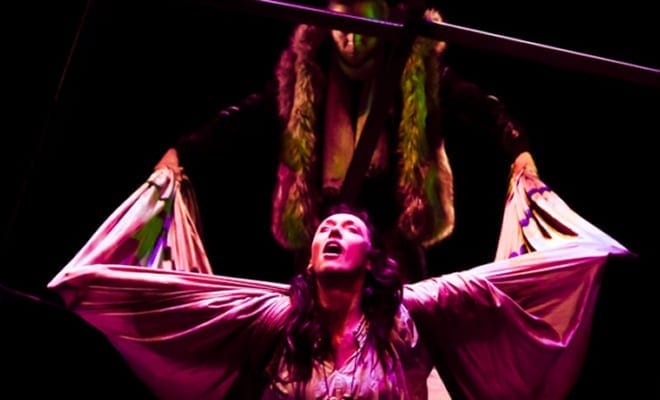
The Performance Creation Concentration, offered in Goddard’s MFA in Interdisciplinary Arts (MFAIA) program, is designed to provide a learning context that blurs lines between authored, collaborative, and interpretive models of performance.
Goddard’s approach to performance creation is unique. By assembling a learning community of artists working in theater, dance, music and sound, spoken word and other oral forms, hybrid performance practices, digital performance, and the intersection of performance and technology (including film making), we’ve established a context in which students can work across boundaries that too often limit an artist’s practice. The concentration is designed to capitalize on Goddard’s low-residency model, allowing students to build their performance practice in their home communities and, through the use of technology, to establish working partnerships with students, alumni, and faculty across the world.
The concentration is available to students who attend residencies at the Vermont or Washington campuses.
Request more information from an Admissions Counselor.
The Faculty
The MFA-IA program’s interdisciplinary approach to learning encourages you as a performance creator to expand your existing practice, exploring how the work you strive to make can be informed by bodies of knowledge that cross traditional disciplinary boundaries and performance genres. To this end, all faculty in the MFA-IA program are available to advise students who enroll in the Performance Concentration. Expertise among faculty spans a wide range of performance-engaged knowledge and practices. Students might choose to develop their performance practices in dialogue with faculty who write poetry or memoir one semester, and faculty whose primary practice is in experimental sound and music, theater, social justice performance or disability culture the next. Other areas of expertise include multi-media installation, painting, experimental video, digital media, American studies, queer theory, ecology, somatic speculative writing, social practice, auto-ethnography and much more. Award winning faculty of the program include Fulbright Scholars, Simon Guggenheim Foundation Fellows, and National Endowment for the Arts grantees.
Location
Twice a year, at the start of each semester, students who enroll in the Performance Creation Concentration attend an intensive eight-day residency at the College’s Plainfield, Vermont campus or Port Townsend Washington campus. Residencies are a rich time of exploration, connection, and planning.
The Plainfield campus in central Vermont is about a 15-minute drive from Montpelier, the capital of Vermont, and an hour from Burlington, one of Vermont’s largest cities.
Low-Residency Model
At the start of the semester, students attend an intensive eight-day residency in Vermont, followed by 16 weeks of independent work and self-reflection in close collaboration with a faculty advisor. Goddard pioneered this format nearly a half century ago to meet the needs of adult students with professional, family, and other obligations seeking learning experiences grounded in the real-world.
Residencies are a time to explore, network, learn, witness, and share with peers, staff, and faculty. Students work with advisors and peers in close-knit advising groups to forge individualized study plans that describe their learning objectives for the semester.
Working closely with their faculty advisors, and supported by fellow learners, students identify areas of study, personal goals, relevant resources, and avenues to achieve these goals. Students also attend and are invited to help organize workshops, keynote addresses, celebrations and other events intended to stimulate, inspire, and challenge.
This low-residency model combines the breadth of a collaborative community with the focus of personalized learning, enhanced by insightful exchanges with a faculty advisor.
Concentration Requirements Summary
Students who successfully complete the concentration will receive a concentration notation on their final transcript.
In addition to fulfilling (or as a means of navigating) the existing MFA-IA degree requirements, the concentration requires students to:
- Engage with the concentration for a minimum of four semesters of the five-semester MFAIA program.
- Build significant creative work each semester, through direct production, experimental explorations, and research.
- Develop 45-50 short critical reflection papers.
- Develop three longer critical essays.
- Complete a thesis presenting a fully-realized performance work.
- Participate in at least two collaborative learning opportunities during one’s course of study and two performance-related workshops during each residency.
- Demonstrate significant engagement with artworks, performance, and theory beyond one’s existing cultural experience.
